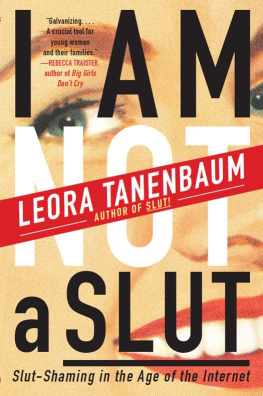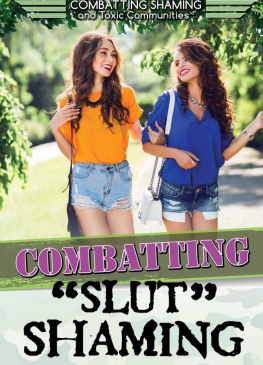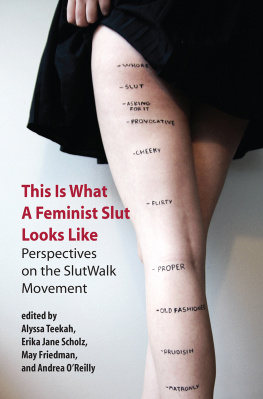
CONTENTS
Youre a sixteen-year-old girl flopped on the sofa, trying to vaporize anxious thoughts about the SAT prep youre behind on and the classmate who cackled and tweeted the moment she saw your outfit this morning. With one hand, you reach over for the remote and power on the TV. With your other hand, you grab your phone and check your Instagram and Twitter. Whichever screen you look at, you come across images of women acting like stereotypical sluts and hosand getting rewarded for their behavior. You pay attentionmaybe you could learn a thing or two.
On E!, you see Miley Cyrus twerking at the MTV Video Music Awards. Is this the same girl on your old Hannah Montana sheets? You marvel over how raunchy and uninhibited she iswhat an improvement over her boring, wholesome old Disney identity. Meanwhile, a friend has Instagrammed a paparazzi shot of Lindsay Lohan getting out of a limo, her short dress exposing the fact that shes not wearing underwear. You wonder if she flashed the photographers on purposeprobably, you figure, because one thing she is wearing is a big smile. And heres another photothis ones of Rihanna, braless in a see-through dress. Shes posing for photographers, looking completely relaxed, so she must know she looks amazing. A text message pops up on your phone; youre invited to a Pimps and Hos party on Saturday night. You know the party is just an excuse for the girls to get away with wearing as little as possible, and you cant deal with the pressure of figuring out a hot outfit. But if you dont go, youll be missing out, so you start thinking about which shoes, top, and skirt will make you look sluttyin a good way.
You roam through the channels on TV, pausing when you find The Bachelor . Several women are sitting in a hot tub in string bikinis, making sexual advances and vying for the attention of a man they barely know. One of these women will win a ring on her finger. On another channel, you catch a scene from an old rerun of 30 Rock . Producer Liz Lemon, played by Tina Fey, is far from a slut, yet she calls herself and her colleague Jenna sluts in a casual, hip way, as if to show how ironic and witty she is. Finally, you settle on Keeping Up with the Kardashians , even though you cant remember why these sisters are famousis it because they never tire of showing off their bodies? No matter. You still enjoy watching them ooze sexual confidence.
You compulsively check your Twitter for comments on that girl who got drunk on Friday night and supposedly hooked up with three different boys. OMGthere are photos and videos of her doing a drunken striptease! You can see her face clearly. Classmates are responding: What a ho! lol! and Sloppy slut and Whore deserves to be raped! Even though you didnt take off any of your clothes, you also drank too much at the same party, and you dont remember everything that went down. Youre terrified that pictures of you will surface, too. So far, youve been safe. Phew! The other girl didnt come to school yesterday, but today she showed up and everyone was horrible to her. The boys kept coming up to her and asking her to send them naked pictures of herself. One of the girls went right up to her and asked why she wore such an ugly leopard-print bra, and then laughed and said maybe it was a good thing after all that she took it off. You were careful not to make eye contact with the girl, even though you feel bad for her. You want to show everyone that you disapprove of the disgusting things she supposedly didbut you dont know exactly what she did, if anything.
All of a sudden your Twitter feed is going crazy. Everyones tweeting about some guy in California who went on a shooting spree, killing six college students before shooting himself in the head. Turns out he was angry that girls werent interested in him, and he had vowed to slaughter every blond slut he saw. How did he define slut, anyway? You wonder: Would he have considered me a slut? Would he have murdered me?
Welcome to the homeland of teenage girls and young women, a contradictory landscape in which females are applauded for sexual audacity when theyre not being humiliated and disgraced. New ideas about female sexual liberation clash with old stereotypes about good girls and sluts.
In celebrity land, women embrace a slutty persona as a conscious marketing strategy. When a private sex tape with an old boyfriend surfaces, it opens up new business opportunities rather than creating a shameful scandal. No skirt for these women is too short; no blouse is too low-cut. On the surface, these women seem to be strong role models, even feminists; they tell the world that women can be as sexually liberated as men always have been.
For teenage girls in real life, slutty behavior is an entirely different thing. Girls who dress like Miley Cyrus are mocked and harassed. At best, their names become punch lines. At worst, they become vulnerable to acts of violence. Their reputations can become ruined, and because of the inescapability of Internet chatter, they have nowhere to hide.
What is going on? How can we make sense of this bizarre and jarring contradiction between the behavior sold to girls as good and the very bad consequences for them when they emulate their role models? This contradiction is not simply the result of celebrity culture running amok. Reality is running amok. Because it is in reality, not only on some Hollywood set or in the media, that sluts are put on a pedestal one moment and then spat upon the next. How has this happened?
The quick, blithe answer is: the Internet. But we have to dig deeper to fully understand the situation in which girls and young women find themselves. The Internet has enabled us to communicate in new ways. But it has also altered face-to-face communication. Even when we arent connected to any digital gadget or computer, we behave differently from the ways we did fifteen years ago. We all experience and respond to new behavioral norms. Its not incorrect to blame the Internet, but we have to be clear about what we mean. Blaming the Internet is like blaming culture or the patriarchy for sexist behavioral norms. We need to understand all the dynamicsonline and offlinein the new sexual landscape for young females.
I have been researching and tracking the subject of girls being labeled sluts and hos for twenty years. In the 1990s, I coined and popularized the term slut-bashing to describe a specific form of student-to-student verbal sexual harassment in which a preadolescent or adolescent girl is bullied because of her perceived or actual sexual behavior. The term slut-bashing caught on; it is now used as a matter of course by parents, school administrators, academics, and girls and women themselves. My 1999 book about slut-bashing, Slut! Growing Up Female with a Bad Reputation, became assigned reading in many sociology and gender or womens studies courses on college campuses nationwide.
Several years ago, I decided to update my research. My plan had been to speak with a new crop of adolescent girls to confirm that slut-bashing is as much of a problem now as it had been then. But the more people I spoke with, the more I came to recognize that the problem is actually much worse today, and that it affects not only adolescent girls but also young women. The new world order of the Internet has upended everything, and I had to completely rethink my arguments. Thus, I Am Not a Slut is not simply an update to Slut!. It is not merely a report on why girls are slut-bashed and how they respond. This book casts a spotlight of a wider circumference. In these pages, I explore the meanings of slut for both adolescent girls and college-age women; the reasons that so many young people today, in the age of the Internet, refer to females as sluts; the methods and strategies girls and women use to respond; and the consequences, sometimes tragic, that result.
Next page










